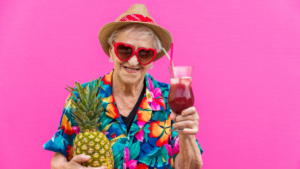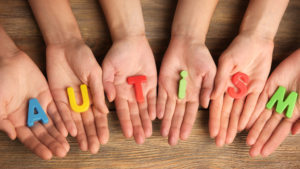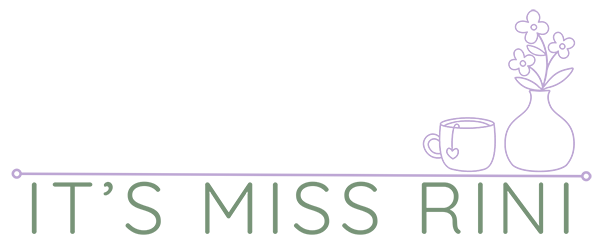This blog article may contain affiliate links to products on Amazon. As an Amazon Associate, I earn from qualifying purchases. This means that if you click on the provided links and make a purchase, I may earn a commission at no additional cost to you. The inclusion of affiliate links is intended to support the maintenance and growth of this blog. Thank you for your understanding and support.
People say the darndest things! Telling people I’m Autistic elicits a variety of responses and comments. Some of them lovely, some of them funny, and some of them downright rude really. I’ve compiled a list of the top 10 comments that people make when they find out I’m Autistic. Most of them just stem from a lack of knowledge about what Autism is, but some of them can be hurtful too.
Coming out as Autistic can be a very scary and daunting experience. I know when I was first diagnosed, I wondered how I would tell certain people. I started off with my close family, and then friends, and finally business associates and customers. In fact, the local newspaper wrote an article on my Autism diagnosis (in the context of me being a business owner) and that really let the cat out of the bag!
Along the way, I have received many responses to the news, so I thought it would be useful to make a list of the most common ones. My hope is that by discussing these comments, other newly-diagnosed Autistic people can be somewhat prepared for what’s to come. I also hope that neurotypical people will find it useful to gain an insight into what effect their comments might have and maybe rethink what they wanted to say (or the way in which they want to say it).
Without further ado, here they are:

- You don’t look Autistic
So what does an Autistic person look like? Most often the portrayals in the media are extreme and tend to show more visible traits like being non-verbal or showing obvious stimming (which are physical movements we use to soothe ourselves). Autism is a wide spectrum and many Autistic people, including me, hide or camouflage their autistic traits. This is called masking and I’m a next-level expert at it. In fact I’ve had five decades of experience to get really good at it. I’ve learned techniques to cope with social situations and cover up my confusion and discomfort. If I’m not feeling tired, I can even maintain normal eye contact and facial expressions too.

- We’re all a bit Autistic aren’t we?
No. No we’re not. Autistic people are Autistic. Neurotypical people may share some traits with them, but it doesn’t make them Autistic. For example you might have some sensory issues where you feel more comfortable in certain environments due to the light or noise levels, but it doesn’t interfere with your life and you don’t have a whole lot of other traits that coexist with that. My husband is quite particular about food textures, but he’s definitely not Autistic. In fact this type of comment can be seen as a bit dismissive, like the struggles we face as Autistic people are not significant and we should just get on with it. It’s really a form of ableism.

- Oh, I’m so sorry to hear that!
Although I appreciate the sentiment, I have not been diagnosed with a terminal illness. In fact, I’ve always been Autistic for my entire life. If you didn’t feel sorry for me before, then why start now? Seriously though, my diagnosis was a positive revelation for me. It was a pivotal moment in my self-discovery. Getting my diagnosis had a big impact on my life and my mental health moving forward. I’ve been able to use it as a lens to look back on my life and really examine my strengths and weaknesses, and I’ve gained a much greater understanding of who I am, why I am the way I am, and most importantly, a feeling of self-acceptance.

- Oh, everyone is being diagnosed with that these days.
No they’re not. Currently the percentage of Autistic adults in Australia is roughly less than 1%. I think there are probably two main reasons that there might be a perception of a higher number being diagnosed. Firstly, Autism is being talked about more. This is a very good thing, because it leads to more awareness, education, and understanding. Secondly, diagnosticians have better ways of identifying Autism. Back in the 70s and 80s when I was growing up (and dinosaurs roamed the earth!), Autism was not considered to be a female thing and so many girls went undiagnosed or misdiagnosed for years. This means that there are groups of women who did not get the help they needed and suffered over the years based on a biased diagnostic system. Fortunately, this is not the case today and we are finally able to get an accurate diagnosis for something we’ve been dealing with our whole lives.

- You didn’t do that before you knew you were autistic.
When I received my diagnosis at age 50, I was quite relieved and felt more comfortable about being who I am. I mentioned earlier about masking, and this is really a survival mechanism that I used to fit in and cope with the world, all the while being quite terrified that somebody would find out that I’m a bit different. After my diagnosis, I began to relax a bit and have no fear that ppl will find out, because I quite openly tell them. This means that some of my Autistic behaviours are now “allowed” in my head and I feel OK to express them. I’ve also given myself permission to avoid situations that make me uncomfortable without having to make up an excuse. So in one way, the person making that comment is right…..in that they didn’t see those behaviours. But that doesn’t mean they weren’t always there. I’m just OK with showing them now.

- My brother/friend/colleague is autistic, and you’re nothing like them.
Here’s an interesting fact. One of my sisters is also Autistic. Autism can have a genetic component so this was not a surprise to either of us. She was also diagnosed late in life (around the same time as me). Although we do share many Autistic traits in common, she is also quite different to me. For example, noise is an issue for her, she is very shy, she isn’t hyperactive like me, and many more traits which I won’t go into for the sake of her privacy. It’s called Autism Spectrum Disorder for a reason: it’s a spectrum. This doesn’t mean that on one end are people who are very Autistic, and on the other, mildly Autistic. There are people scattered all over the spectrum with a combination of different traits. As all people are different, so are all Autistic people.

- You’re high functioning, right? It’s not real autism?
High functioning is a term that used to be used for people with Level 1 Autism. It’s not used these days, and with good reason. It dismisses the very real and severe struggles of people with Level 1 Autism, while at the same time coming across as judgemental of those with level 2 or level 3 Autism. Take me as an example. I have excellent language and verbal skills. I have a high IQ, a Science degree, a successful business that I started from scratch, a 30 year marriage, children, I’m a valuable team member at Quiz nights, and can figure out the inner workings of a water pump like a pro. Would it surprise you to know that I am officially a level 2 on the Autism diagnosis scale? Capability is not something you can assess from the outside.

- No you’re not. Are you sure?
This is one of the weirdest responses I get. If you were to tell somebody that you’d been diagnosed with Diabetes, would you get this response? I guess that people have a certain image or stereotype of Autism and they don’t think that I match it. As for if I’m sure: yes, I’m sure. So is the lead doctor for my assessment, a very knowledgeable and respected woman with a PhD in the field of autism in adult women. The assessment process itself is quite extensive. It takes place over hours and includes questionnaires, interviews, responses to scenarios, lengthy delving into my childhood etc. It’s quite exhausting. And at the end of it, I got a 20 page report detailing all the aspects of my particular style of Autism. So yes, I’m quite sure. This comment is one of the more hurtful responses. Just as we work up the courage to reveal something quite personal, we’re hit with the implication that we might be making it up. I’ve even had someone imply that I’m lying about it for attention, which is ironic because I dislike attention very much. Also, I’m not sure that you’d actually want attention for a disability? Wouldn’t you rather make up a story about some sort of outstanding achievement or incredible success? Something that puts you in a glowing light of adoration? As I said, it’s one of the weirdest responses.

- But you seem so normal!
Do I? Well done to me! My years of masking have paid off. Also, what exactly is normal? I know some delightfully quirky and eccentric people in my life who are not neurodivergent. Wouldn’t it be boring if we were all the same?

- What is Autism anyway?
Well I’m glad you asked! A quick Google search reveals the following:
A serious developmental disorder that impairs the ability to communicate and interact. Autism spectrum disorder impacts the nervous system. The range and severity of symptoms can vary widely. Common symptoms include difficulty with communication, difficulty with social interactions, obsessive interests and repetitive behaviours.
Hopefully you’ve learned from this article that Autism is quite complex. You probably know some Autistic people in your life already and may not even be aware of it. Maybe you suspect that you’re Autistic yourself? Either way, I encourage you to learn more. I’ve got a more in-depth personal account of my own Autism journey in my blog post “Being Autistic” if you want to start there.
As for me, if I had known more about what Autism is and what it looks like, I may have saved myself years of struggle. Now, it’s my goal to spread as much awareness as I can, in the hope of saving somebody else that trouble.
Some reading (if you want to know more).
There are also lots of great books you can read, like:
Women and Girls with Autism Spectrum Disorder
Unmasking Autism. The Power of embracing our hidden neurodiversity
And these are available in an audio book which you can get for FREE with an Audible membership trial:
Looking after your Autistic Self
Loving someone with Asperger’s syndrome
